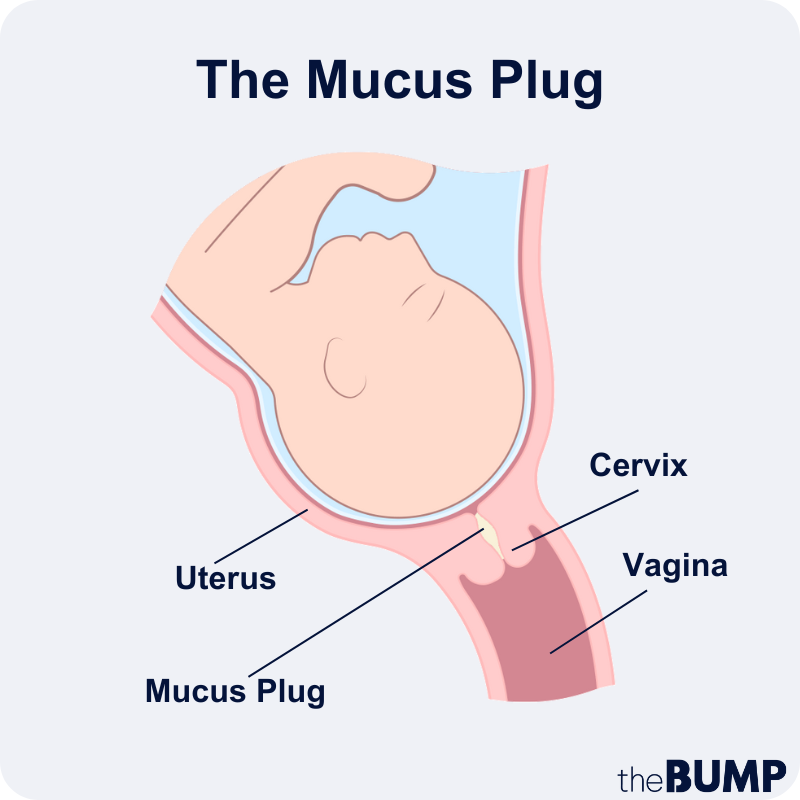What You Need to Know About Losing Your Mucus Plug
There’s a lot of new terminology to absorb when you’re pregnant. You may have heard some of the language in passing, or you’re hearing it for the first time after that positive pregnancy test. The term “mucus plug” (also sometimes referred to as the cervical plug) is probably one such phrase. Spoiler: You’ll hear it more and more as you get closer to your due date; your provider may even ask if you think you’ve lost it in the final weeks before delivery. But before that happens, it’s good to have a basic understanding of what a mucus plug is and what purpose it serves.
The mucus plug is, much like you’d expect, a thick plug of mucus and cells from the cervix that covers the opening of the uterus during pregnancy, explains Charles Ascher-Walsh, MD, an ob-gyn and system senior vice chair of the division of gynecology at Mount Sinai Hospital in New York City. So when does the mucus plug form? Your mucus plug starts to form when you become pregnant and the glands in your cervix secrete mucus, he says. But it doesn’t reach its full size until you’re about 12 weeks along. It usually stays in place throughout your pregnancy until your cervix begins to dilate (more on this below). A mucus plug plays an important role in preventing bacteria from entering the uterus during pregnancy, adds Maureen Whelihan, MD, an ob-gyn at Elite GYN Care of the Palm Beaches in Greenacres, Florida.
Mucus plug vs. discharge
So what’s the difference between a mucus plug and discharge? While they may look the same, a mucus plug is distinctly different from “regular” discharge—it’s thicker and there’s more of it, says Michael Cackovic, MD, a maternal-fetal medicine physician at the Ohio State University Wexner Medical Center in Columbus. Normal vaginal discharge varies with the change in hormone levels during your regular cycle, but hormone levels during pregnancy are different and more constant, which creates a different type of mucus that turns into the mucus plug. Additionally, while typical vaginal discharge helps to keep vaginal tissues healthy and lubricated and protect against both bacterial infections and tissue irritation, the mucus plug is intended purely to block the cervix and protect the uterus and growing fetus from bacteria.
Are you wondering what your mucus plug will look like when it comes out? Well, as you can imagine, it’s mucus-y! It’s also thick and may be slightly bloody, Cackovic says. “A mucus plug color is usually white, yellowish, beige or brown, or any variant thereof. It can [also] have a red or pink tinge associated with blood,” he adds. The bleeding can occur as the cervix starts to dilate (i.e. widen) and efface (i.e. thin out) ahead of labor, explains Rachel Gerber, MD, a board certified reproductive endocrinologist and infertility specialist at RMA of New York-Westchester. For this reason, you may also hear the loss of your mucus plug referred to in tandem with the “bloody show.”
As for how big the mucus plug is, it’s meant to “plug” your cervix, so it’s approximately four centimeters long. It has a volume of about two tablespoons (in case you’re really curious). Losing a mucus plug can be a bit startling if it comes out all at once, but knowing what to expect when it comes to mucus plug discharge can help. Don’t be alarmed at the color or texture of your mucus plug discharge—Whelihan likens it to a “thick ball of snot.” It’s likely to make its appearance when you use the bathroom—so toward the end of your pregnancy, be on the lookout.
Doctors and nurses usually ask whether a woman has lost her mucus plug when she’s in the later stages of her pregnancy—and there’s a reason for this. Losing a mucus plug is usually a sign that your body is preparing to go into labor (though a lost mucus plug isn’t a guarantee—confusing, we know). You might also hear your provider talk about mucus plug discharge. What does it mean for your mucus plug to “discharge?” In this case, it’s just another way of saying that the mucus plug has moved from the cervix into the vagina.
That said, the timing of each pregnant person’s mucus plug discharge is different, meaning there’s no precise timeline. Plus, some women may lose their mucus plug gradually, noticing small amounts of mucus plug discharge over the course of a few days or even weeks, Gerber says. Typically, though, you lose your mucus plug sometime after 37 weeks. It’s possible to lose your mucus plug earlier, but that should prompt a call to your doctor. “Early loss may indicate preterm changes in the cervix and potential risk for preterm labor,” Whelihan says. “Also, loss of a mucus plug potentially exposes the pregnancy to infection.” If you think you lost your mucus plug early or aren’t sure, talk to your doctor. In fact, says Cackovic, “any increase in vaginal discharge [during pregnancy] should prompt a discussion and possible evaluation by an ob-gyn.”
What does it mean when your mucus plug falls out?
Wondering what happens when you lose your mucus plug? Again, losing your mucus plug “generally implies a change in the cervical opening size, either via dilation (widening) or effacement (softening and becoming thinner),” Whelihan says. This occurs because your hormones change at the end of your pregnancy—which is why losing your mucus plug often means labor is starting or your body is preparing for labor. That naturally prompts the question, “Can you dilate without losing your mucus plug?” The answer is no. “If the cervix dilates, the plug will always fall out,” Ascher-Walsh says.
Is it okay if your mucus plug discharges early?
If your mucus plug discharges a little early it may be just fine, especially if you’re close to your due date, Gerber says. In fact, losing a mucus plug after 37 weeks is perfectly normal (but it’s still a good idea to let your provider know when you lose it so they’re aware). If you lose your mucus plug before 37 weeks—or you notice bloody discharge during that time—definitely contact your healthcare provider. It may not be a cause for concern, or it could be a sign of preterm labor, so it’s always best to check. If you’re experiencing vaginal discharge and bleeding that’s more like a period, contact your provider immediately.
Wondering how long after losing your mucus plug does labor start? Unfortunately, losing your mucus plug isn’t a guarantee labor will start immediately after. So how long after you lose your mucus plug will you go into labor? That depends. “It could be hours, days or weeks” until a woman goes into labor after losing her plug, Cackovic says. “It’s not the reliable sign that some make it out to be.” Though losing your mucus plug is typically a sign that labor is on its way, there’s not a prescribed time period for when it will actually begin.
How to make your mucus plug come out
If you’re past your due date, it’s understandable to want to do what you can to get labor going. It’s also natural to assume that making your mucus plug come out will speed up the process. Unfortunately, that’s not the case. While there are plenty of myths about this, none have been proven, Ascher-Walsh says.
So, if you’re wondering, “Should you pull out your mucus plug?”, the answer is a hard no. Your mucus plug is there for a reason—to protect you and baby—and it will come out when it’s time. Your doctor will have other ways to speed up the process, such as using Pitocin, if it becomes necessary. Otherwise, try to relax and let nature take its course. Besides, it’s possible you already lost your mucus plug and just didn’t realize it.
Again, it’s important to call your provider if you notice you’ve lost your mucus plug earlier than 37 weeks, as it could be a sign of preterm labor. Aside from that, Gerber notes it’s also a good idea to call if:
- The mucus plug is accompanied by heavy bleeding
- You have regular contractions, your water broke or you experience other signs of labor
- You have any unusual symptoms or any other concerns
Frequently Asked Questions
How do I know if I lost my mucus plug?
While some women will spot the plug as soon as it comes out, it’s quite possible you might not realize you’ve lost your mucus plug at all. “Many women will never even pay attention to it,” Whelihan says. Don’t stress if you’re getting close to your due date and you haven’t seen a mucus plug. “The loss of it has no real importance other than serving as a sign that labor may be soon,” Ascher-Walsh says.
Will you always lose your mucus plug?
As long as your cervix dilates, you will lose your mucus plug, Gerber says. However, every mucus plug is different, just like every person is different. You may not always realize it has come out. Again, some women lose their mucus plug more gradually, rather than in one or several clumps. You may just notice an increase in discharge rather than a dramatic mucus plug moment.
What are some things to avoid after losing the mucus plug?
Your mucus plug is what protects baby and the uterus against infection during pregnancy, so once you’ve lost it there are some things you’ll want to avoid to reduce your risk of infection, Gerber notes. These include using tampons and submerging yourself in water (i.e. in pools, hot tubs, bath tubs, etc.). If your mucus plug has come out and your water has broken, your provider may also recommend avoiding having sex.
How do you get rid of the mucus plug?
You shouldn’t “actively try to get rid of the mucus plug,” Gerber says. “It will come out naturally when your cervix begins to dilate and efface.” In fact, she notes it’s best not to do anything to induce labor yourself unless guided by your provider.
How do you speed up labor after losing the mucus plug?
Wondering how to speed up labor after losing your mucus plug? Unfortunately, Gerber notes there are “no guaranteed ways to speed up labor after losing the mucus plug.” However, anecdotal evidence says the following might be worth trying (with the green light from your provider):
- Walking and light exercise
- A membrane sweep
- Nipple stimulation
How dilated are you when you lose your mucus plug?
You’ll only start to lose your mucus plug once your cervix begins to change (i.e. dilate and efface), Gerber explains. That said, while losing the mucus plug is a sign of dilation, there’s no set amount of dilation required for it to happen. “Some women may be only slightly dilated, while others may be further along,” she adds.
Can a membrane sweep make you lose your mucus plug?
A membrane sweep is when your provider uses their finger to sweep your cervix in an effort to separate the amniotic sac from the uterus and jumpstart labor—and it can cause you to lose your mucus plug, Gerber notes.
As you near the end of your pregnancy, you’re likely eager to move on to the next chapter and meet baby. But remember, that losing your mucus plug is just one small part of the bigger picture. “The loss of the mucus plug is a natural part of the labor process, and while it can be a sign that labor is approaching, it’s not a precise predictor of when labor will begin,” Gerber says. “Every pregnancy is different, and the experience of losing the mucus plug can vary widely among women.” The best thing to do for now? Keep your provider informed about changes and unusual symptoms as you near your due date, and don’t hesitate to reach out to them with any questions or concerns.
Please note: The Bump and the materials and information it contains are not intended to, and do not constitute, medical or other health advice or diagnosis and should not be used as such. You should always consult with a qualified physician or health professional about your specific circumstances.
Plus, more from The Bump:
Charles Ascher-Walsh, MD, is an ob-gyn and system senior vice chair of the division of gynecology at Mount Sinai Hospital in New York City. He earned his medical degree from the State University of New York at Brooklyn. He completed a master’s degree and his residency at Columbia University.
Michael Cackovic, MD, is a maternal-fetal medicine physician at Ohio State University Wexner Medical Center. He has over 20 years of experience and earned his medical degree from Drexel University College of Medicine.
Rachel Gerber, MD, is a board certified reproductive endocrinologist and infertility specialist at RMA of New York-Westchester. She earned her medical degree from the Icahn School of Medicine at Mount Sinai and completed her residency at New York Presbyterian/Weill Cornell Medical Center.
Maureen Whelihan, MD, is an ob-gyn at Elite GYN Care of the Palm Beaches in Greenacres, Florida. She earned her medical degree from the University of South Florida College of Medicine and completed her residency at University of Florida Shands Jacksonville.
Learn how we ensure the accuracy of our content through our editorial and medical review process.
Navigate forward to interact with the calendar and select a date. Press the question mark key to get the keyboard shortcuts for changing dates.





















































